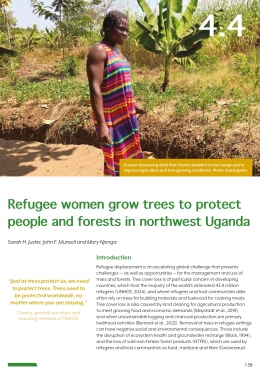Ano de publicação
2001
Autores
Idioma
English
Palavras-chave
agroforestry, income, soil fertility, trees
Geográfico
Philippines

CIFOR-ICRAF aborda desafios e oportunidades locais ao mesmo tempo em que oferece soluções para problemas globais para florestas, paisagens, pessoas e o planeta.
Fornecemos evidências e soluções acionáveis para transformer a forma como a terra é usada e como os alimentos são produzidos: conservando e restaurando ecossistemas, respondendo ao clima global, desnutrição, biodiversidade e crises de desertificação. Em suma, melhorar a vida das pessoas.

Explore eventos futuros e passados em todo o mundo e online, sejam hospedados pelo CIFOR-ICRAF ou com a participação de nossos pesquisadores.

A ciência precisa de canais de comunicação claros para cortar o ruído, para que a pesquisa tenha algum impacto. O CIFOR-ICRAF é tão apaixonado por compartilhar nosso conhecimento quanto por gerá-lo.

Découvrez les évènements passés et à venir dans le monde entier et en ligne, qu’ils soient organisés par le CIFOR-ICRAF ou auxquels participent nos chercheurs.

Jelajahi acara-acara mendatang dan yang telah lalu di lintas global dan daring, baik itu diselenggarakan oleh CIFOR-ICRAF atau dihadiri para peneliti kami.

Pour que la recherche ait un impact, la science a besoin de canaux de communication clairs pour aller droit au but. CIFOR-ICRAF est aussi passionné par le partage de ses connaissances que par leur production.

Para que la investigación pueda generar algún impacto, los conocimientos científicos requieren de canales de comunicación claros. En CIFOR-ICRAF, compartir nuestros conocimientos nos apasiona tanto como generarlos.

Explore eventos futuros y pasados organizados por CIFOR-ICRAF o con la participación de nuestros investigadores.

O CIFOR-ICRAF publica mais de 750 publicações todos os anos sobre agrossilvicultura, florestas e mudanças climáticas, restauração de paisagens, direitos, política florestal e muito mais – em vários idiomas..
Navegue pelas pesquisas publicadas do CIFOR-ICRAF em uma ampla variedade de formatos, todos disponíveis gratuitamente online.

Ilmu pengetahuan membutuhkan saluran komunikasi yang jelas untuk mencapai tujuan, jika ingin dampaknya terlihat. CIFOR-ICRAF sangat bersemangat untuk berbagi pengetahuan sembari menghasilkan pengetahuan itu sendiri.

CIFOR-ICRAF alcança impacto baseado na ciência. Conduzimos pesquisas inovadoras, fortalecemos a capacidade dos parceiros e nos engajamos ativamente no diálogo com todas as partes interessadas, trazendo os insights mais recentes sobre florestas, árvores, paisagens e pessoas para a tomada de decisões globais.

CIFOR-ICRAF aborda desafios e oportunidades locais ao mesmo tempo em que oferece soluções para problemas globais para florestas, paisagens, pessoas e o planeta.
Fornecemos evidências e soluções acionáveis para transformer a forma como a terra é usada e como os alimentos são produzidos: conservando e restaurando ecossistemas, respondendo ao clima global, desnutrição, biodiversidade e crises de desertificação. Em suma, melhorar a vida das pessoas.

CIFOR–ICRAF achieves science-driven impact. We conduct innovative research, strengthen partners’ capacity and actively engage in dialogue with all stakeholders, bringing the latest insights on forests, trees, landscapes and people to global decision making.

CIFOR–ICRAF publishes over 750 publications every year on agroforestry, forests and climate change, landscape restoration, rights, forest policy and much more – in multiple languages.
Browse CIFOR–ICRAF’s published research in a wide range of formats, all of which are available for free online.

CIFOR–ICRAF addresses local challenges and opportunities while providing solutions to global problems for forests, landscapes, people and the planet.
We deliver actionable evidence and solutions to transform how land is used and how food is produced: conserving and restoring ecosystems, responding to the global climate, malnutrition, biodiversity and desertification crises. In short, improving people’s lives.
2001
English
agroforestry, income, soil fertility, trees
Philippines
O Centro de Pesquisa Florestal Internacional e o Centro Internacional de Pesquisa Agroflorestal (CIFOR-ICRAF) pesquisamo poder das árvores, florestas e paisagens agroflorestais para enfrentar os desafios globais maisprementesdo nosso tempo – perda de biodiversidade, mudanças climáticas, segurança alimentar, meios de subsistência e desigualdade. CIFOR e ICRAF são Centros de Pesquisa CGIAR.
© 2025 Centro Internacional de Pesquisa Florestal (CIFOR) e Centro Internacional de Pesquisa Agroflorestal (ICRAF) | CIFOR e ICRAF são Centros de Pesquisa do CGIAR | Aviso de privacidade do CIFOR-ICRAF



